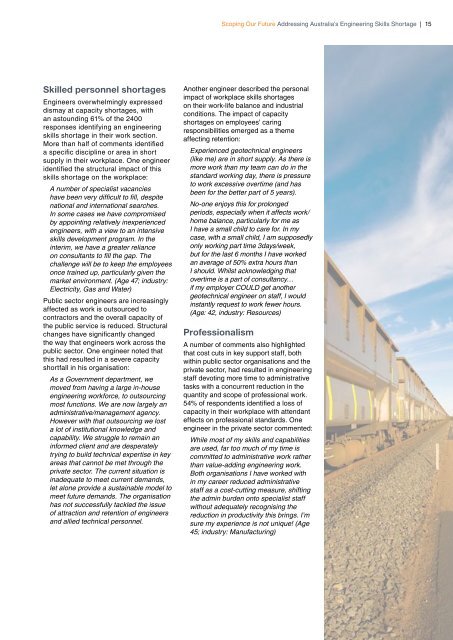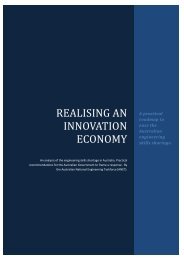14 | Scoping Our Future Addressing Australia’s <strong>Engineering</strong> Skills Shortage<strong>ANET</strong>’s December2009-January 2010 survey ofengineers gauged engineers’experience of the engineeringskills shortage at theirworkplace, the local andbroader effects of any capabilityshortage, and the utilisationof their skills as professionalengineers. The survey revealedthat respondents had a firstrateunderstanding of the localand broader quality, cost andproductivity effects that skillsand capacity shortages continueto have on industry and theprofession. Respondents camefrom across all industries,both public and private sector.Professional engineers are ahighly educated workforce, andare well aware of the issuesfacing their organisations.Market rates,market problemsA recent <strong>ANET</strong> survey of consultingengineer employers found that the singlelargest obstacle to recruitment, retentionand growth in consultancies is theshortage of engineers. <strong>Australian</strong> firms arecompeting in a tight global skills market,with strong demand for skilled engineeringprofessionals; growth of demand forengineering skills in remote and regionalareas places additional pressures onemployers seeking to attract and retain thebest staff. One firm reported:The largest obstacle is the shortageof skilled graduates and engineeringprofessionals; in addition, much of <strong>our</strong>work is in remote areas, and it is difficultto get highly skilled engineers to take onthese roles.Despite a fluctuation of demand followingthe global financial crisis, long-termlab<strong>our</strong> market problems have not beenalleviated. Consulting firms reporteddifficulty in attracting qualified lab<strong>our</strong>due to competitive salary stress. Onerespondent noted:Prior to the GFC, the market wasextremely restricted in terms of availableprofessional engineering. This wasexacerbated by ever increasing salariesin an attempt to attract the best talent.In certain skills set this created anenvironment where candidates werebeyond the reach of consultancies.Post GFC has created a new setof conditions, where top talent areremaining where they are and in somecases proving difficult to recruit. 35Consult Australia’s 2009 Skills Surveyshowed that respondent firms had themost trouble recruiting skilled personnelat mid and senior level. While the 2009financial downturn slackened skillsshortage pressures in some areasof industry such as the res<strong>our</strong>cessector, evidence from <strong>ANET</strong> partnerorganisations and their members hasshown that overall the downturn inengineering related industries hasnot proven to be long-term. Smallerorganisations particularly are struggling toretain capacity as the economy picks up.Skills shortages,workforce impactsThe shortage of skilled engineers hasspecific workplace consequences forindividual engineers and the professionas a whole. Anecdotal evidence suggeststhat many employers, faced with financialimperatives, structure work aroundcapacity constraints rather than seekingto build capacity among the existing andstretched workforce. For instance, lackof workplace capacity leads to relianceon contractors and external expertisein larger organisations, including publicsector infrastructure providers. Thisreliance is to the detriment of generalistworkforce training; contractors developspecialist expertise rather than generalistengineering capacity, with knock-on effectsto professional standards and structures.Responses to the <strong>ANET</strong> engineerssurvey showed that engineers arealready experiencing the professionaland industrial consequences of capacityshortages at their workplace. Acrossindustries and sectors, engineersidentified that their work was sufferingfrom skills and capacity shortages, with54% of respondents identifying a loss ofcapability in their workplace. Commentsrevealed that this was having impacts oncosts, quality and safety. 36Engineers comments on skillsand capacity shortages wererevealing. A strong theme of <strong>ANET</strong>’sconsultation with the engineeringworkforce has been the dismay ofengineers about the effects of theskills shortage, not only on theircapacity to perform their jobs, butalso on the status of their professionin their workplaces and on the qualityof their work overall. Engineersare highly educated professionals,with a strong understanding of therelationship between their work, theiremployer’s capacity, and the effectson the broader community, and thiscame across strongly in responses tothe survey.35 <strong>ANET</strong> (2010) Consulting Employers Survey,unpublished results.36 <strong>Australian</strong> <strong>National</strong> <strong>Engineering</strong> <strong>Taskforce</strong> (2010)<strong>ANET</strong> Engineers Survey.
Scoping Our Future Addressing Australia’s <strong>Engineering</strong> Skills Shortage | 15Skilled personnel shortagesEngineers overwhelmingly expresseddismay at capacity shortages, withan astounding 61% of the 2400responses identifying an engineeringskills shortage in their work section.More than half of comments identifieda specific discipline or area in shortsupply in their workplace. One engineeridentified the structural impact of thisskills shortage on the workplace:A number of specialist vacancieshave been very difficult to fill, despitenational and international searches.In some cases we have compromisedby appointing relatively inexperiencedengineers, with a view to an intensiveskills development program. In theinterim, we have a greater relianceon consultants to fill the gap. Thechallenge will be to keep the employeesonce trained up, particularly given themarket environment. (Age 47; industry:Electricity, Gas and Water)Public sector engineers are increasinglyaffected as work is outs<strong>our</strong>ced tocontractors and the overall capacity ofthe public service is reduced. Structuralchanges have significantly changedthe way that engineers work across thepublic sector. One engineer noted thatthis had resulted in a severe capacityshortfall in his organisation:As a Government department, wemoved from having a large in-houseengineering workforce, to outs<strong>our</strong>cingmost functions. We are now largely anadministrative/management agency.However with that outs<strong>our</strong>cing we losta lot of institutional knowledge andcapability. We struggle to remain aninformed client and are desperatelytrying to build technical expertise in keyareas that cannot be met through theprivate sector. The current situation isinadequate to meet current demands,let alone provide a sustainable model tomeet <strong>future</strong> demands. The organisationhas not successfully tackled the issueof attraction and retention of engineersand allied technical personnel.Another engineer described the personalimpact of workplace skills shortageson their work-life balance and industrialconditions. The impact of capacityshortages on employees’ caringresponsibilities emerged as a themeaffecting retention:Experienced geotechnical engineers(like me) are in short supply. As there ismore work than my team can do in thestandard working day, there is pressureto work excessive overtime (and hasbeen for the better part of 5 years).No-one enjoys this for prolongedperiods, especially when it affects work/home balance, particularly for me asI have a small child to care for. In mycase, with a small child, I am supposedlyonly working part time 3days/week,but for the last 6 months I have workedan average of 50% extra h<strong>our</strong>s thanI should. Whilst acknowledging thatovertime is a part of consultancy…if my employer COULD get anothergeotechnical engineer on staff, I wouldinstantly request to work fewer h<strong>our</strong>s.(Age: 42, industry: Res<strong>our</strong>ces)ProfessionalismA number of comments also highlightedthat cost cuts in key support staff, bothwithin public sector organisations and theprivate sector, had resulted in engineeringstaff devoting more time to administrativetasks with a concurrent reduction in thequantity and scope of professional work.54% of respondents identified a loss ofcapacity in their workplace with attendanteffects on professional standards. Oneengineer in the private sector commented:While most of my skills and capabilitiesare used, far too much of my time iscommitted to administrative work ratherthan value-adding engineering work.Both organisations I have worked within my career reduced administrativestaff as a cost-cutting measure, shiftingthe admin burden onto specialist staffwithout adequately recognising thereduction in productivity this brings. I’msure my experience is not unique! (Age45; industry: Manufacturing)




